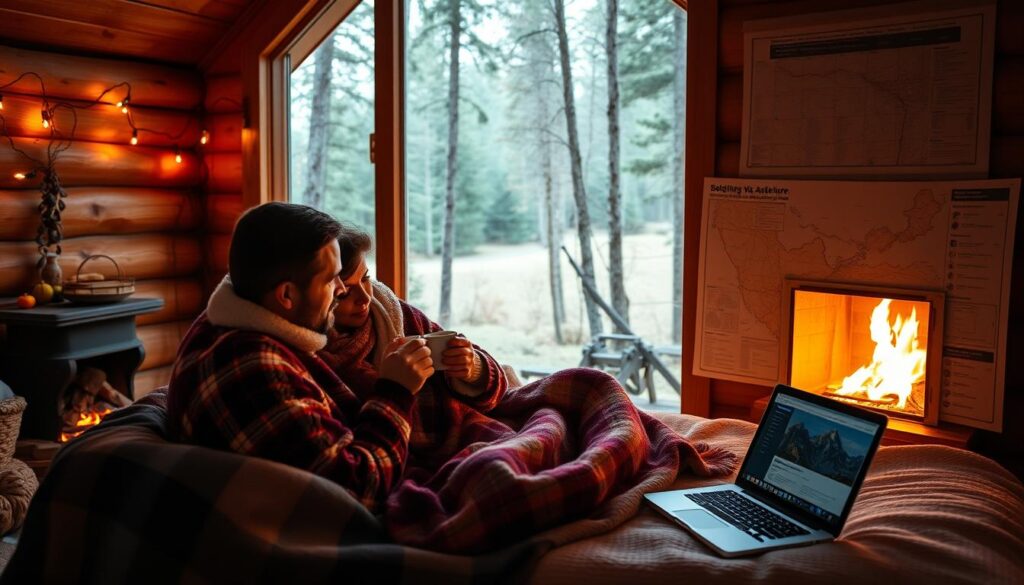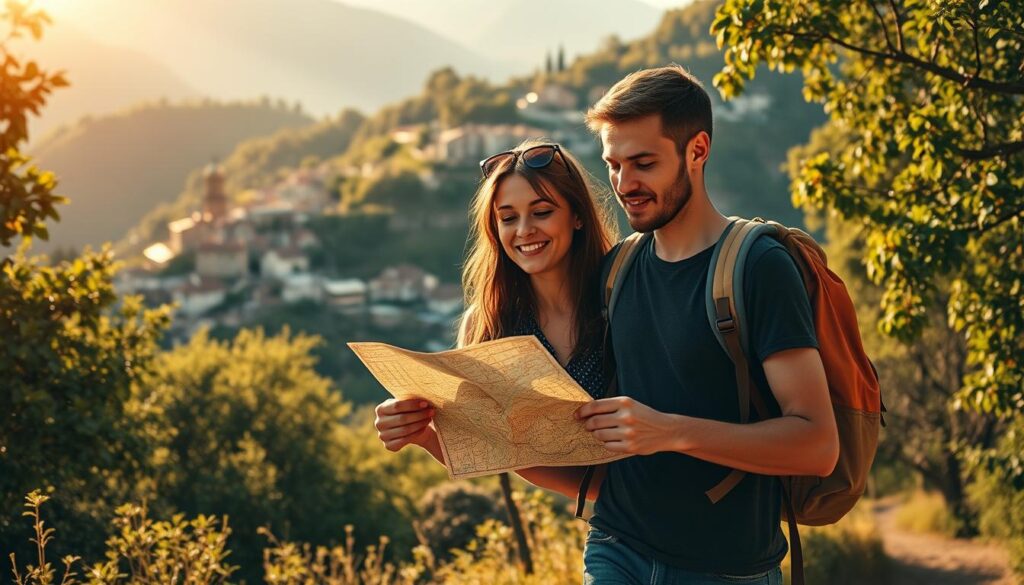Travel Safety Tips: Staying
Secure on the Road
Are you ready for the unexpected on your next trip? Whether it’s a long drive or a quick weekend escape, road trip safety is key.
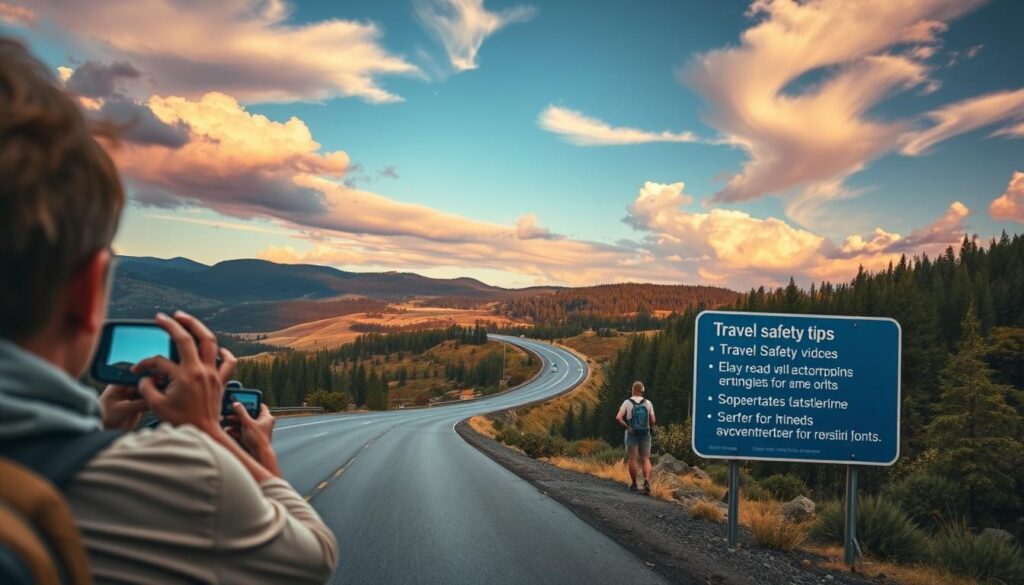
With more accidents and surprises on the road, knowing safe travel practices is vital. It ensures your journey is fun and safe.
When planning your trip, remember the value of travel safety tips. This article will show you how to stay safe on the road.
Key Takeaways
- Plan your route and check the weather forecast before you leave.
- Ensure your vehicle is in good condition before embarking on your journey.
- Always wear a seatbelt and encourage your passengers to do the same.
- Keep emergency contact numbers handy.
- Stay alert and avoid driving when tired.
The Importance of Travel Safety Planning
Planning for travel safety is key when you’re exploring new places. It makes sure your trip is fun and safe. Before you go, knowing how to reduce risks is important for a great experience.
Why Safety Preparation Matters Before Departure
Getting ready for your trip is vital. Research your destination and learn about local customs. This way, you can avoid problems and enjoy your travels more.
Common Travel Safety Misconceptions
Many people don’t think safety planning is that important. They might think safety isn’t a big deal or that they can handle anything. But, these beliefs can be wrong.
Statistics on Travel Incidents
- Recent stats show many travelers face issues, from small problems to serious safety issues.
- Knowing these numbers helps you prepare better and make safer choices.
Balancing Caution with Enjoyment
It’s important to think about safety but also enjoy your trip. Being ready and informed lets you have fun without worrying too much.
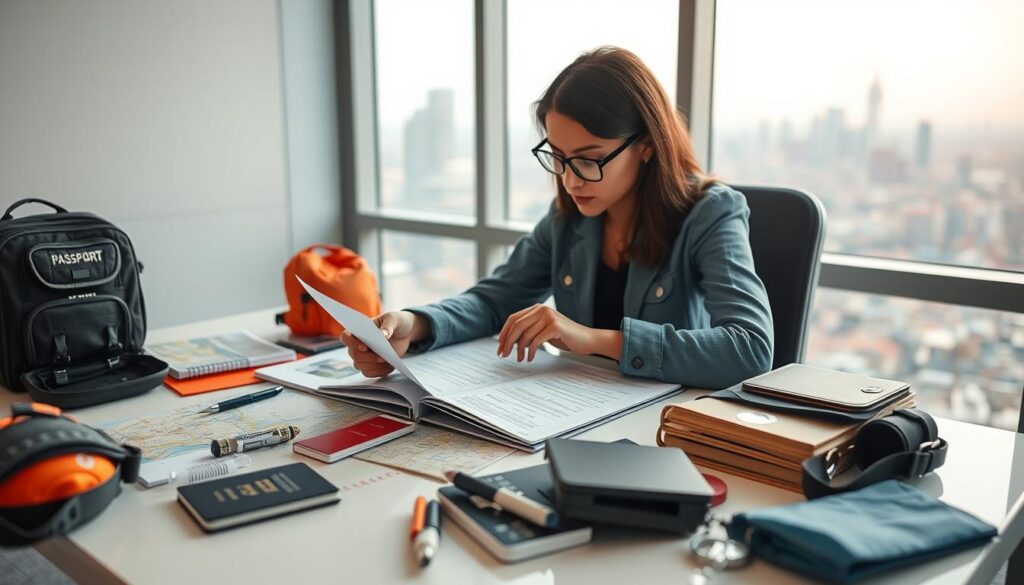
Good travel safety planning is about research, preparation, and staying alert. By planning well, you can have a safer and more fun trip.
Pre-Trip Safety Preparations
Before you start your trip, it’s key to get ready well. This ensures a safe and fun journey. Good pre-trip safety steps can really improve your travel.
Essential Documentation and Copies
Having the right papers is important for a smooth trip. You’ll need your passport, visa (if needed), and travel insurance papers.
Passport and Visa Requirements
Make sure your passport is good for at least six months after you leave. Check if you need a visa and apply early if you do.
Digital Backups of Important Documents
Save digital copies of your passport, visa, travel insurance, and driver’s license. Keep them safe online, like in a cloud service. Also, carry a physical copy in your bag.
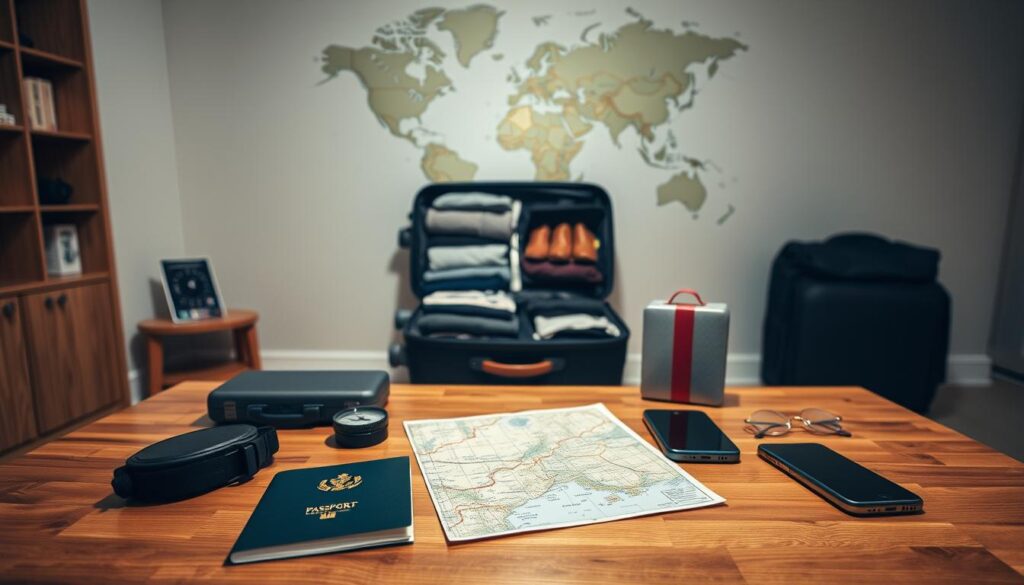
Travel Insurance Considerations for UK Travelers
Travel insurance is a must for UK travelers. It helps with unexpected medical costs, trip cancellations, and lost items. Look at the coverage, excess, and what’s not included when picking a policy.
Emergency Contact Planning
Having the right contact info ready for emergencies is key.
International Emergency Numbers
Save important phone numbers, like your embassy and emergency services, in your phone. Also, sign up for travel alerts from your government.
Embassy Registration Procedures
Registering with your embassy adds security. Many governments have online services for travelers.
By focusing on these safety steps before your trip, you’ll feel safer and enjoy your journey more.
Packing Smart for Secure Travel
To travel safely, pack with safety in mind. Include items not on your usual list. Your luggage is key to your travel security.
Security-Focused Packing Essentials
For secure packing, consider your luggage first. Anti-theft bags and accessories protect your stuff from thieves. Look for bags with slash-proof straps, RFID-blocking material, and lockable zippers.
Anti-Theft Bags and Accessories
Anti-theft bags have special features like:
- Slash-proof straps to stop bag slashing
- RFID-blocking pockets for passport and credit card safety
- Lockable zippers to keep things secure
Clothing with Hidden Compartments
Use clothing with hidden compartments to hide valuables. Think jackets with secret pockets or money belts under your clothes.
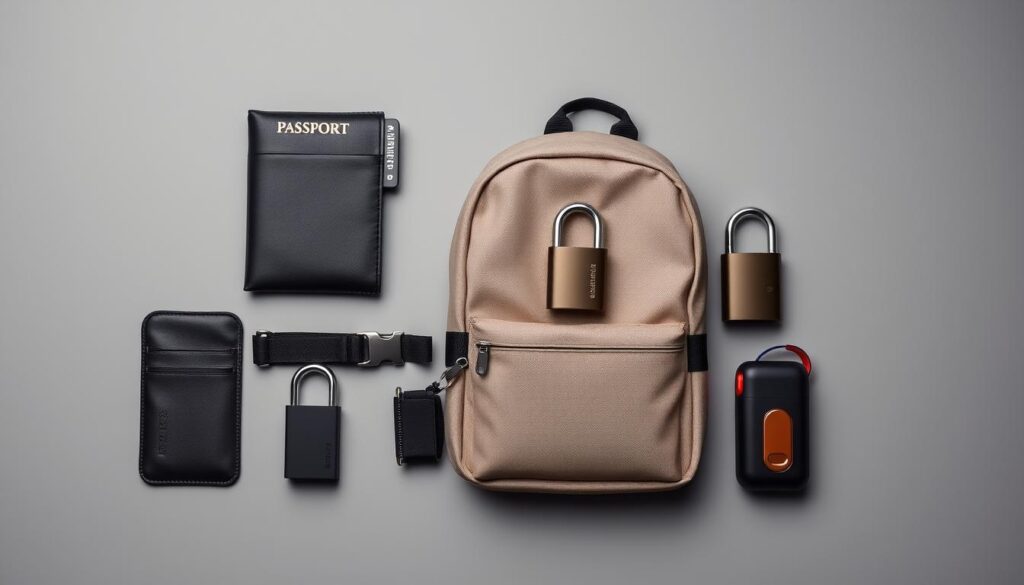
Money and Valuables Management
Effective money and valuables management is key. Use cash, credit cards, and traveler’s checks. Keep them in different, safe spots. A money belt or secure wallet is a good idea.
Tech Security Items to Bring
In today’s world, tech security is as vital as cash and passport safety. Pack portable locks and security devices for your laptop and other devices.
Portable Locks and Security Devices
Some great tech security items are:
- Portable locks for your luggage
- USB encryption devices for data safety
- Anti-surveillance devices for privacy
With these security items, smart money management, and the right tech gear, you’ll travel safer.
Vehicle Safety for Road Trips
Going on a road trip means you need to be ready. This includes vehicle safety checks and safe driving practices. Make sure your car is in good shape before you start your trip. This will help you have a safe and fun journey.
Pre-Departure Vehicle Checks
Before you leave, do a detailed check on your vehicle. This includes:
- Checking the condition and tread depth of your tires
- Ensuring all lights, including headlights, taillights, and brake lights, are functioning properly
- Verifying the health of your battery and checking for any signs of wear on belts and hoses
Essential Maintenance Checklist
Here’s a checklist to make sure your car is ready for the road:
| Check | Status |
|---|---|
| Tire Pressure | OK |
| Brake Pads | OK |
| Fluid Levels | OK |
Rental Car Inspection Tips
If you’re renting a car, check it well before you leave. Look for any damage and make sure it’s noted. Also, check that safety features like airbags and anti-lock brakes are working.
Safe Driving Practices in Unfamiliar Territories
Driving in new places needs extra care. Know the local driving rules and customs. Always have a map or GPS with you.
Adapting to Local Driving Rules
Learn the local traffic laws, like speed limits and right-of-way rules. Be ready for different driving situations, like roundabouts or priority roads.
Navigation and Route Planning
Plan your route ahead of time, thinking about road conditions and hazards. Use a GPS or mapping app to stay on course and avoid getting lost.
Emergency Vehicle Supplies
Always have a basic emergency kit in your car. This should include a spare tire, jumper cables, and a first-aid kit. Being ready can really help in an emergency.
Travel Safety Tips: Staying Secure on the Road
When you start your trip, it’s important to be ready and aware. Knowing how to stay safe and protect yourself at rest stops is key. This is all part of road safety.
Situational Awareness Techniques
Being aware of your surroundings is key to staying safe. This means recognizing threats and knowing how to act.
Recognizing Possible Threats
Threats can be people or road conditions. Staying alert helps you spot these threats early.
Trusting Your Instincts
If something feels off, trust your gut. Getting out of a bad situation is a smart safety move.
Safe Navigation Strategies
Navigation is more than just getting where you’re going. It’s about doing it safely. Use GPS and maps to stay on course.
Rest Stop and Refueling Safety
When you stop, pick safe places. Look for areas that are well-lit and busy.
Choosing Safe Places
Safe places have good lighting and cameras. Stay away from lonely spots.
Protecting Your Stuff During Breaks
Keep your things safe during stops. Don’t show off valuables, and watch your car.
| Safety Tip | Description | Benefit |
|---|---|---|
| Situational Awareness | Stay alert to surroundings | Early threat detection |
| Safe Navigation | Use GPS and maps | Avoid getting lost |
| Secure Rest Stops | Choose well-lit areas | Reduced crime risk |
By following these travel safety tips, you can make your road trip safer. This way, you’ll have a better and safer journey.
Accommodation Security Measures
Traveling safely means your accommodation must be secure. The place you stay can greatly affect your trip. So, it’s key to think about the security features.
Hotel and Rental Safety Checks
Do a safety check before you settle in. Look at where your room is and how close it is to exits.
Securing Your Room
Always lock your door, even when you’re inside. Use the deadbolt if you can. A portable door lock can add extra security.
Safe Storage of Valuables
Use hotel safes or lockboxes for important items. This includes passports, cash, and jewelry.
Using Hotel Safes Effectively
- Make sure the safe works before you use it.
- Keep your valuables tidy and note what you have.
Alternative Security Solutions
If there’s no safe, think about other options. Money belts or secure bags can be good alternatives.
Digital Security While Traveling
Keeping your digital life safe is key when you’re traveling. You face many cyber dangers that could steal your personal info and mess up your trip.
Public Wi-Fi Precautions
Be careful with what you do on public Wi-Fi. Unsecured networks can let hackers get your data.
VPN Usage and Benefits
A Virtual Private Network (VPN) makes your internet use safer on public Wi-Fi. It adds a shield against data theft.
Secure Payment Practices
Choose secure payment methods like credit cards or digital wallets. They offer fraud protection. Try to avoid using debit cards online.
Device and Data Protection
Keep your devices safe with strong passwords and updated software. Updates often fix security holes.
Social Media Safety Tips
Think twice about what you post on social media while traveling. Delayed posting can stop thieves from knowing you’re away.
Delayed Posting Strategies
Post about your trip later, when you’re back home. This lowers the chance of your stuff being targeted.
Location Sharing Risks
Don’t share your exact location in real-time. It can tell thieves where you are.
Personal Safety in Unfamiliar Environments
When you explore new places, keeping safe is key. Whether it’s a new city or trails you’ve never seen, knowing your area is important. It makes your trip safe and fun.
Blending In with Locals
Staying safe means blending in with the locals. This means acting like them and dressing like them. It makes you less likely to attract trouble.
Appropriate Dress and Behavior
Dressing like the locals helps you fit in. In conservative places, dress modestly to avoid attention. Also, don’t show off wealth with fancy jewelry or watches.
Cultural Awareness Benefits
Knowing the culture helps you blend in and enjoy your trip more. It lets you handle social situations better and avoid mistakes.
Safe Transportation Choices
Picking the right way to get around is key. Choose reputable taxi services or apps, and check the driver’s ID. On public transport, keep an eye on your stuff and don’t go alone in quiet spots.
| Transportation Mode | Safety Tips |
|---|---|
| Taxis | Use licensed services, check driver’s ID |
| Public Transport | Be aware of belongings, avoid isolated areas |
| Ride-sharing | Verify driver’s identity, share trip details with friends |
Nighttime Safety Precautions
At night, be extra careful. Stick to well-lit areas and don’t walk alone in dark places.
Group Travel Advantages
Traveling with friends is safer at night. There’s safety in numbers, and fewer people will bother you.
Well-lit Route Selection
At night, pick routes that are bright and busy. Avoid dark, quiet paths.
By following these tips, you can stay safe in new places. Stay informed, watch your surroundings, and take steps to keep your journey safe and fun.
Health and Medical Safety Abroad
Traveling abroad means you need to plan for health and safety. Before you go, think about what you need to stay safe and healthy. This will make your trip better.
Essential Medical Preparations
Start by getting ready with your medical needs. This includes:
- Checking your vaccination requirements
- Managing your prescription medication
Vaccination Requirements
Every country has its own vaccine needs. Talk to your doctor or a travel clinic to find out what you need for your trip.
Prescription Medication Guidelines
If you take medicine, pack enough for your trip. Also, bring a copy of your prescription and a letter from your doctor.
Food and Water Safety
Bad food or water can make you sick. To stay safe, do this:
- Drink bottled or filtered water
- Avoid undercooked or raw foods
Accessing Healthcare While Traveling
Know how to get medical help if you need it. This is very important.
UK Travel Health Insurance Coverage
If you’re from the UK, check if your health insurance works abroad. Some plans cover you internationally.
International Hospitals and Clinics
Look up hospitals and clinics where you’re going. Keep their numbers handy.
| Destination | Recommended Vaccinations | Healthcare Options |
|---|---|---|
| Country A | Hepatitis A, Typhoid | Private hospitals, local clinics |
| Country B | Yellow Fever, Rabies | Public hospitals, international clinics |
Handling Emergency Situations
Traveling can lead to unexpected emergencies. Being ready for these situations can greatly affect your trip.
What to Do If You're Robbed
If robbed while traveling, staying calm is key. Immediate action helps reduce loss and aids in recovery.
Immediate Steps to Take
- Report the incident to local authorities right away.
- Cancel any stolen credit cards or identification.
- Contact your bank to inform them of the situation.
Reporting Procedures
Get a police report. It’s needed for insurance claims or to replace stolen documents.
Natural Disaster Protocols
Follow local instructions during a natural disaster. Stay informed through local news and emergency alerts.
| Disaster Type | Immediate Action | Follow-Up |
|---|---|---|
| Earthquake | Drop, Cover, and Hold On | Check for injuries and damage |
| Hurricane | Seek shelter immediately | Stay indoors until the storm passes |
Lost Passport and Documentation Issues
Losing your passport is tough. UK embassy assistance can help.
UK Embassy Assistance
Reach out to the UK embassy or consulate. They can guide you on replacing your passport and getting temporary travel documents.
Temporary Documentation Options
An emergency travel document may be issued. It helps you return to the UK.
Enjoying Peace of Mind on Your Journey
When you’re getting ready for your next trip, remember the safety tips from this article. Knowing your surroundings, keeping valuables safe, and staying informed will give you peace of mind. This way, you can enjoy your travels without worry.
Safe travel isn’t just about avoiding danger. It’s also about being ready for anything unexpected. By following these tips, you’ll be ready to face any challenge and stay safe on your journey.
Planning and preparation are key to a safe trip. Research your destination, stay updated on local news, and listen to your gut. With these steps, you can travel with confidence and peace of mind.

